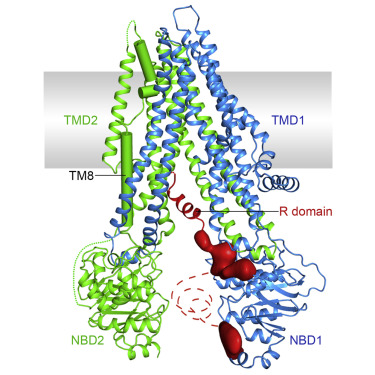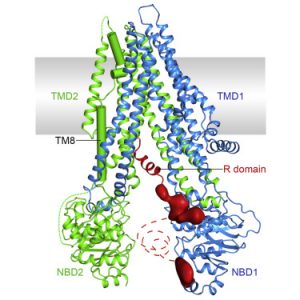Researchers Map 3D Structure of CFTR, the Protein Involved in Cystic Fibrosis
Written by |

Molecular structure of the CFTR protein
Rockefeller University researchers have mapped the three-dimensional structure of the protein involved in cystic fibrosis (CF).
The mapping is important because knowing more about the CFTR protein will provide scientists with valuable insight into its activity and may lead to novel therapies for CF.
Findings of the study, “Molecular Structure Of The Human CFTR Ion Channel,” were published in the journal Cell.
CF is caused by mutations in the CFTR gene that encodes the CFTR protein, which is an ion channel. Normal CFTR protein works by transporting chloride and sodium across the cell membrane, regulating sweat, digestive fluids, and mucus.
When faulty, the protein causes an accumulation of mucus in a number of organs, including the pancreas, liver, kidneys, intestine and lungs. The accumulation allows microbes such as P. aeruginosa to grow.
Excessive bacterial or fungal growth in the lungs can lead to inflammation that triggers severe consequences.
Using modern microscopy, such as electron cryomicroscopy, researchers came up with more detail on the CTFR protein’s molecular structure in humans. The mapping provides useful information about how the ion channel opens and closes, what activates and what inhibits its activity, what mutations affect the protein, and how they affect it.
An important finding was that the human form of CFTR is similar to that of the zebrafish. Scientists have used the fish a lot in the laboratory to learn more about CFTR when it was difficult to study its human form.
“With these detailed new reconstructions, we can begin to understand how this protein functions normally, and how errors within it cause cystic fibrosis,” Jue Chen, the study’s senior author, said in a news release. “We now know that the conclusions we drew from our previous work in zebrafish also apply to us.”
The similarity between human and zebrafish CFTR reinforces scientists’ initial decision to use the fish to understand CFTR’s functions, the disease-causing mutations that can occur in it, and how the mutations affect CF patients.
Cystic fibrosis symptoms include organ scarring, or fibrosis, respiratory difficulties, sinus infections, poor growth and infertility.
Scientists have found more 1,000 mutations of the CFTR gene so far.







